Assistant Referee Duties
- Indicate ball out of play
- Indicate side entitled to goal kick, corner kick, throw-in
- When a player may be penalized for being in an offside position
- When a substitute is requested
- When an incident has occurred outside the view of the referee
- Keep a back-up record of the match
- Indicate when offenses have been committed whenever the assistant referee is closer to the action than the referee (this may include offenses committed in the penalty area)
- Indicate during a penalty kick, whether the goalkeeper has moved forward before the ball has been kicked, and if the ball has crossed the line
- Indicate when misconduct or other incident has occurred outside the view of the referee
- Enter the field to control the minimum required distance


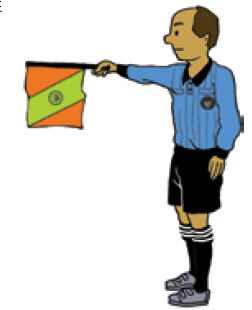
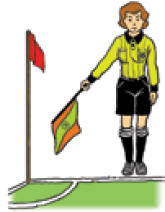
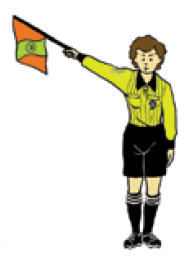
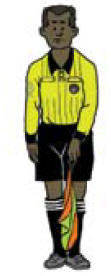


Click on this picture for a video about mirroring signals
If the assistant referee signals a ball out of play, but the referee does not see the signal for an extended period, during which play is stopped and restarted several times, the assistant referee should lower the flag.
The FIFA Referee Committee has declared that it is impossible for the referee to act on the assistant referee's signal after so much play.
If the referee misses the assistant referee's signal for offside, the assistant referee should stand at attention with the flag raised until the defending team gains clear possession or until a goal kick or throw-in is awarded to the defending team.
To avoid such situations, the referee make eye contact with the assistant referees as often as possible.
In addition, the assistant referees must be alert for and mirror each other's signals if needed to assist the referee
Among the specifically stated responsibilities of the assistant referee is to indicate "when a player may be penalized for being in an offside position."
Because "it is not an offense in itself to be in and offside position," the assistant referee must interpret this responsibility to require that it is clear not only an attacker is in an offside position but also that that same player is involved in active play by interfering with play, interfering with an opponent, or gaining an advantage by being in the offside position.
The assistant referee should use his or her unique perspective on the touchline as a trained, neutral official and provide the appropriate signal so that the referee can make a final determination as to whether the attacker will be penalized for an offside infringement.
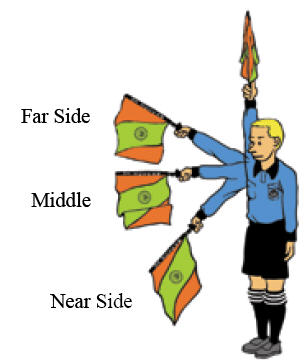
Where neutral assistant referees are not available, the referee may use club linesmen.
Club linesmen should report to the referee before the start of the game for instructions.
The referee should make it clear that the decision of the referee is final and must not be questioned.
The relationship of club linesmen to the referee must be one of assistance, without undue interference or any opposition.
Club linesmen are to signal only when the ball is entirely over the goal line or touch line.